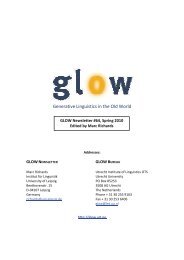Flesh<strong>in</strong>g out this model fur<strong>the</strong>r, I will argue that <strong>the</strong> different trajectories of this roundtrip (<strong>the</strong> output/<strong>in</strong>put sound pattern—expressed/understood mean<strong>in</strong>g) have a neurologicalcounterpart with specifically human perysilvian networks, whose morphology exhibits aspecific enlargement <strong>in</strong> <strong>the</strong> parieto-occipital-temporal region not registered <strong>in</strong> o<strong>the</strong>r species.Consequently, <strong>the</strong> process underly<strong>in</strong>g primate calls as well as artificial mapp<strong>in</strong>gs <strong>in</strong> captiveenvironments must follow, I hypo<strong>the</strong>size, a different neural pathway, specifically one whichlacks an ‘<strong>in</strong>tersection’ through which to create concepts at will.—abstraction of <strong>the</strong> neural pathways underly<strong>in</strong>g: (left) <strong>the</strong> emergence of wordstrigger<strong>in</strong>g <strong>the</strong> emergence of concepts; (right) <strong>the</strong> production of primate alarm calls—If this picture is correct, <strong>the</strong> systematicity of human thought f<strong>in</strong>ds its place with<strong>in</strong> <strong>the</strong> bra<strong>in</strong>: aneural circuit turns our conceptual precursors, restricted comb<strong>in</strong>atorially, <strong>in</strong>to (a) freecomb<strong>in</strong>able units (‘conjunctive concepts’, <strong>in</strong> <strong>the</strong> sense of Pietroski 2007), (b) voluntarilyaccesible, and susceptible of (c) <strong>in</strong>creas<strong>in</strong>g massively and (d) becom<strong>in</strong>g more complexsemantically, as language develops. Fur<strong>the</strong>r technical details will allow me to extract <strong>the</strong>seand o<strong>the</strong>r m<strong>in</strong>imal requirements of human concepts from <strong>the</strong> specific arrangement of <strong>the</strong>above neurological pathways. Its plausibility, at least, should make l<strong>in</strong>guists and cognitivescientists reconsider where our mental phylogenetic split really began and whe<strong>the</strong>r to stilltreat recursion as <strong>the</strong> fundamental attribute of <strong>the</strong> faculty of language.ReferencesBICKERTON, D. (1990): Language and species, University of Chicago Press.CAREY, S. (2009): The Orig<strong>in</strong> of Concepts, OUP.HAUSER, M., N. CHOMSKY & W.T. FITCH (2002): The Faculty of Language: What Is It, WhoHas It, and How Did It Evolve?, Science, 298, 22, 1569-1579.HINZEN, W. (2006): M<strong>in</strong>d Design and M<strong>in</strong>imal Syntax, OUP.HURFORD, J. (2007): The Orig<strong>in</strong>s of Mean<strong>in</strong>g, OUP.LAURENCE, S. & E. MARGOLIS (2012): The Scope of <strong>the</strong> Conceptual, <strong>in</strong> E. Margolis, R. Samuels &S.P. Stich (eds.), The Oxford Handbook of Philosophy of Cognitive Science, OUP, 291-317.PIETROSKI, P. (2007): Systematicity via Monadicity, Croatian Journal of Philosophy, 7, 21, 343-374.SAMUELS, R. (2002): Nativism <strong>in</strong> Cognitive Science, M<strong>in</strong>d & Language, 17, 3, 233-265.TALLERMAN, M. (2011): Protolanguage, <strong>in</strong> M. Tallerman & K.R. Gibson (eds.), The OxfordHandbook of Language Evolution, OUP, 479-491.
A syntactic treatment of logophoricity and anaphoricity: evidence from verbal agreementSandhya Sundaresan, University of Tromsø (CASTL)/Universität StuttgartAnaphoricity and logophoricity are standardly treated as underly<strong>in</strong>gly dist<strong>in</strong>ct, with <strong>the</strong> formerreceiv<strong>in</strong>g primarily structural treatments (Chomsky, 1981; Hicks, 2009; Reuland, 2011) and <strong>the</strong>latter predom<strong>in</strong>antly semantico-pragmatic ones (Sells, 1987; Kuno, 1987, among o<strong>the</strong>rs) – a dichotomythat is belied by <strong>the</strong> crossl<strong>in</strong>guistically pervasive morphophonological and syntacticosemanticsimilarities between <strong>the</strong> two. My paper will argue that: (I) a unified syntactic treatmentof anaphoricity and logophoricity is empirically warranted, and (II) this can be achieved with<strong>in</strong>an enriched grammatical model where certa<strong>in</strong> types of discourse-pragmatic <strong>in</strong>formation are syntacticallyrepresented. In Tamil, <strong>the</strong> agreement triggered under a (nom<strong>in</strong>ative-marked) subjectstraightforwardly reflects <strong>the</strong> φ-features of this subject:(1) [Nii paris-æ tookkapoogir-aaj-ŭnnŭ]Raman namb-<strong>in</strong>-aan.you[NOM] prize-ACC lose.go-PRS-2SG-COMP Raman believe-PST-3MSG“Raman j believed [ CP that you would lose <strong>the</strong> prize].”However, when <strong>the</strong> simplex anaphor ta(a)n occurs <strong>in</strong> subject position, <strong>the</strong> agreement triggeredunder it tracks ta(a)n’s antecedent:(2) Maya i [ CP Raman jMaya Raman[ CP taan {i,∗j,∗k} paris-æANAPH[NOM] prize-ACCtookkapoo-gir-aaí-nnŭ]lose.go-PRS-3FSG-COMPnamb-<strong>in</strong>-aan-ŭnnŭ] [pasaN-gaí-kiúúæ] k kaaúú-<strong>in</strong>-aaí.believe-PST-3MSG-COMP boy-3PL-ALL show-PST-3FSG“Maya i showed [<strong>the</strong> boys] k [ CP that Raman j believed [ CP that she i /*he j /*<strong>the</strong>m k wouldlose <strong>the</strong> prize]].”(3) Maya i [ CP Raman j [ CP taan {j,∗i,∗k} paris-æ tookkapoo-gir-aan-nnŭ]Maya Raman ANAPH[NOM] prize-ACC lose.go-PRS-3MSG-COMPnamb-<strong>in</strong>-aan-ŭnnŭ] [pasaN-gaí-kiúúæ] k kaaúú-<strong>in</strong>-aaí.believe-PST-3MSG boy-3PL-ALL show-PST-3FSG“Maya i showed [<strong>the</strong> boys] k [ CP that Raman j believed [ CP that he j /*she i /<strong>the</strong>m k wouldlose <strong>the</strong> prize]].”(4) Seetha i naãandadæ-patti joosi-čč-aaí. Taan i eenSeetha[NOM] happen<strong>in</strong>g-ACC-about reflect-PST-3FSG. ANAPH[NOM] whykašúappaúú-iru-kk-aaí?suffer-PRF-PRS-3FSG“Seetha i reflected about what had happened. Why had she i suffered?”When <strong>the</strong> <strong>in</strong>tended antecedent is 3FSG Maya (2), <strong>the</strong> agreement under ta(a)n is also 3FSG,but <strong>in</strong> <strong>the</strong> m<strong>in</strong>imally vary<strong>in</strong>g (3), <strong>the</strong> agreement under ta(a)n is 3MSG, with <strong>the</strong> only possibleantecedent be<strong>in</strong>g Raman. In (4), ta(a)n refers “logophorically” to <strong>the</strong> extra-sentential attitudeholderSeetha, but <strong>the</strong> agreement under ta(a)n must still reflect <strong>the</strong> φ-features of this antecedent:if Seetha were replaced by 3MSG Raman, <strong>the</strong> agreement-mark<strong>in</strong>g would be 3MSG -aan <strong>in</strong>stead.Given (1), it is tempt<strong>in</strong>g to th<strong>in</strong>k that <strong>the</strong> source of agreement under ta(a)n is ta(a)n itself.However, s<strong>in</strong>ce <strong>the</strong> agreement triggered under ta(a)n may vary, this would be tantamount topropos<strong>in</strong>g three different ta(a)n-s <strong>in</strong> (2)-(4). Fur<strong>the</strong>r counter-evidence that ta(a)n directly triggersagreement comes from (5); crucially, (5) also shows that <strong>the</strong> agreement under ta(a)n is notdirectly triggered by ta(a)n’s antecedent (e.g. via long-distance Agree) ei<strong>the</strong>r:
- Page 1 and 2:
GLOW Newsletter #70, Spring 2013Edi
- Page 3 and 4:
INTRODUCTIONWelcome to the 70 th GL
- Page 5:
Welcome to GLOW 36, Lund!The 36th G
- Page 8 and 9:
REIMBURSEMENT AND WAIVERSThe regist
- Page 10 and 11:
STATISTICS BY COUNTRYCountry Author
- Page 12 and 13:
15:45-16:00 Coffee break16:00-17:00
- Page 14 and 15:
14:00-15:00 Adam Albright (MIT) and
- Page 16 and 17:
17:00-17:30 Anna Maria Di Sciullo (
- Page 18 and 19:
16.10-16.50 Peter Svenonius (Univer
- Page 20 and 21:
GLOW 36 WORKSHOP PROGRAM IV:Acquisi
- Page 22 and 23:
The impossible chaos: When the mind
- Page 24 and 25:
17. Friederici, A. D., Trends Cogn.
- Page 26 and 27:
Second, tests replicated from Bruen
- Page 28 and 29:
clusters is reported to be preferre
- Page 30 and 31:
occur (cf. figure 1). Similar perfo
- Page 32 and 33:
argument that raises to pre-verbal
- Page 34 and 35:
Timothy Bazalgette University of
- Page 36 and 37:
. I hurt not this knee now (Emma 2;
- Page 38 and 39:
Rajesh Bhatt & Stefan Keine(Univers
- Page 40 and 41:
SIZE MATTERS: ON DIACHRONIC STABILI
- Page 42 and 43:
ON THE ‘MAFIOSO EFFECT’ IN GRAM
- Page 44 and 45:
The absence of coreferential subjec
- Page 46 and 47:
PROSPECTS FOR A COMPARATIVE BIOLING
- Page 48 and 49:
A multi-step algorithm for serial o
- Page 50 and 51:
Velar/coronal asymmetry in phonemic
- Page 52 and 53:
On the bilingual acquisition of Ita
- Page 54 and 55:
Hierarchy and Recursion in the Brai
- Page 56 and 57:
Colorful spleeny ideas speak furiou
- Page 58 and 59:
A neoparametric approach to variati
- Page 60 and 61:
Lexical items merged in functional
- Page 62 and 63:
Setting the elements of syntactic v
- Page 64 and 65:
Language Faculty, Complexity Reduct
- Page 66 and 67:
Don’t scope your universal quanti
- Page 68 and 69:
Restricting language change through
- Page 70 and 71:
4. Conclusion This micro-comparativ
- Page 72 and 73:
2. Central Algonquian feature hiera
- Page 74 and 75:
availability of the SR reading in (
- Page 76 and 77:
Repairing Final-Over-Final Constrai
- Page 78 and 79:
a PF interface phenomenon as propos
- Page 80 and 81:
(b) Once the learner has determined
- Page 82 and 83:
cognitive recursion (including Merg
- Page 84 and 85:
can be null, or lexically realized,
- Page 86 and 87:
feature on C and applies after Agre
- Page 88 and 89:
Nobu Goto (Mie University)Deletion
- Page 90 and 91:
Structural Asymmetries - The View f
- Page 92 and 93:
FROM INFANT POINTING TO THE PHASE:
- Page 94 and 95:
Some Maladaptive Traits of Natural
- Page 96 and 97:
Constraints on Concept FormationDan
- Page 98 and 99:
More on strategies of relativizatio
- Page 100 and 101:
ReferencesBayer, J. 1984. COMP in B
- Page 102 and 103:
Improper movement and improper agre
- Page 104 and 105:
Importantly, while there are plausi
- Page 106 and 107:
This hypothesis makes two predictio
- Page 108 and 109:
(3) a. Það finnst alltaf þremur
- Page 110 and 111:
(2) Watashi-wa hudan hougaku -wa /*
- Page 112 and 113:
However when the VP (or IP) is elid
- Page 114 and 115:
More specifically, this work reflec
- Page 116 and 117:
modality, or ii) see phonology as m
- Page 118 and 119:
(I) FWHA The wh-word shenme ‘what
- Page 120 and 121:
1The historical reality of biolingu
- Page 122 and 123:
Rita Manzini, FirenzeVariation and
- Page 124 and 125: Non-counterfactual past subjunctive
- Page 126 and 127: THE GRAMMAR OF THE ESSENTIAL INDEXI
- Page 128 and 129: Motivating head movement: The case
- Page 130 and 131: Limits on Noun-suppletionBeata Mosk
- Page 132 and 133: Unbounded Successive-Cyclic Rightwa
- Page 134 and 135: Same, different, other, and the his
- Page 136 and 137: Selectivity in L3 transfer: effects
- Page 138 and 139: Anaphoric dependencies in real time
- Page 140 and 141: Constraining Local Dislocation dial
- Page 142 and 143: A Dual-Source Analysis of GappingDa
- Page 144 and 145: [9] S. Repp. ¬ (A& B). Gapping, ne
- Page 146 and 147: of Paths into P path and P place is
- Page 148 and 149: Deriving the Functional HierarchyGi
- Page 150 and 151: Reflexivity without reflexivesEric
- Page 152 and 153: Reuland, E. (2001). Primitives of b
- Page 154 and 155: on v, one associated with uϕ and t
- Page 156 and 157: Merge when applied to the SM interf
- Page 158 and 159: 1 SachsThe Semantics of Hindi Multi
- Page 160 and 161: Covert without overt: QR for moveme
- Page 162 and 163: Morpho-syntactic transfer in L3 acq
- Page 164 and 165: one where goals receive a theta-rel
- Page 166 and 167: 51525354555657585960616263646566676
- Page 168 and 169: follow Harris in assuming a ranked
- Page 170 and 171: changing instances of nodes 7 and 8
- Page 172 and 173: Sam Steddy, steddy@mit.eduMore irre
- Page 176 and 177: (5) Raman i [ CP taan {i,∗j}Raman
- Page 178 and 179: properties with Appl (introduces an
- Page 180 and 181: econstruct to position A then we ca
- Page 182 and 183: (5) Kutik=i ez guret-a.dog=OBL.M 1S
- Page 184 and 185: sults summarized in (2) suggest tha
- Page 186 and 187: Building on Bhatt’s (2005) analys
- Page 188 and 189: Underlying (derived from ON) /pp, t
- Page 190 and 191: out, as shown in (3) (that the DP i
- Page 192 and 193: Word order and definiteness in the
- Page 194 and 195: Visser’s Generalization and the c
- Page 196 and 197: the key factors. The combination of
- Page 198 and 199: Parasitic Gaps Licensed by Elided S
- Page 200 and 201: Stages of grammaticalization of the





